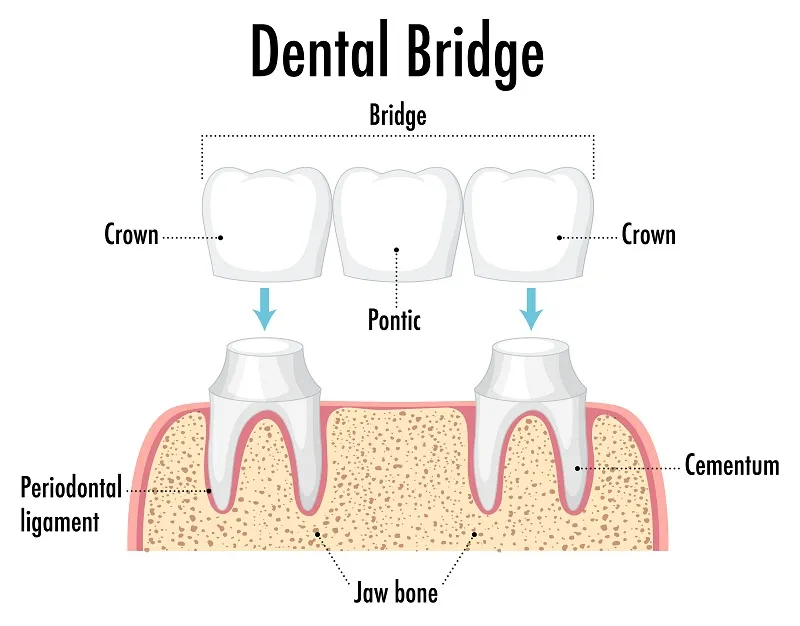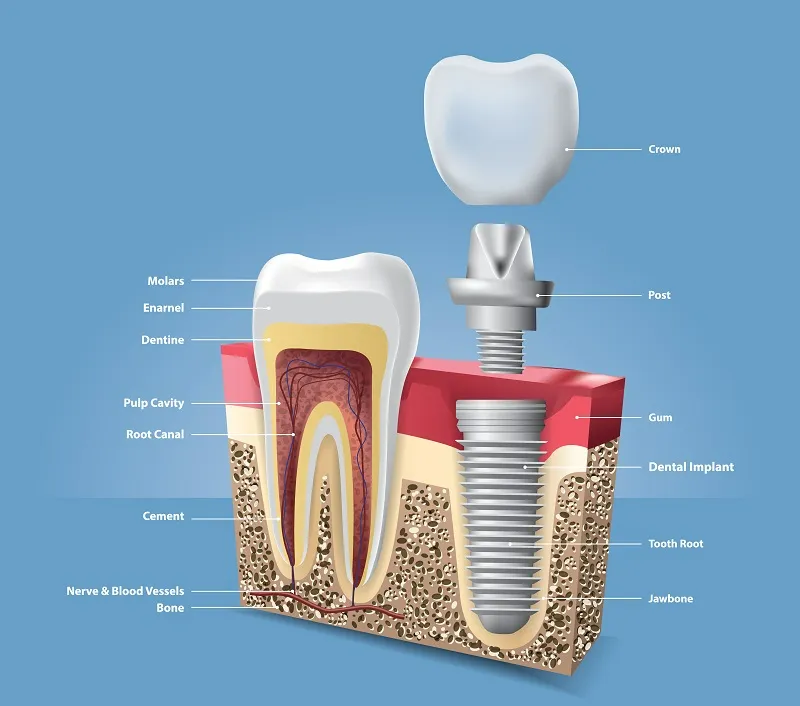Losing a tooth can significantly impact both your smile and your quality of life. Whether caused by injury, decay, or aging, replacing a missing tooth is essential for maintaining good oral health and functionality. With so many options available today, understanding the best ways to replace a missing tooth can help you make an informed decision that suits your budget, needs, and lifestyle. In this article, we’ll explore the 5 best ways to replace a missing tooth, comparing their advantages, disadvantages, and costs.
5 Best Ways To Replace Missing Teeth
Your smile is important, and losing a tooth doesn’t mean you have to live with a gap. With the right dental solutions, you can easily replace a missing tooth and restore both the appearance and function of your teeth.
Let’s explore the 5 Best Ways to Replace a Missing Tooth and Restore Your Smile:
Dentures

Dentures are removable devices that replace missing teeth and surrounding tissues. They can be full dentures (replacing all teeth) or partial dentures (replacing only a few missing teeth).
Benefits of Dentures
- Affordable: Dentures are typically the least expensive option when it comes to replacing a missing tooth.
- Non-invasive: They don’t require surgery, making them a simpler and faster option for many.
- Customizable: Dentures can be crafted to match the natural look of your teeth, improving your smile.
Limitations of Dentures
- Comfort and fit: Some people find dentures less comfortable than other options. They can sometimes feel loose or bulky.
- Maintenance: Dentures require regular cleaning and may need adjustments over time to ensure a proper fit.
Affordability of Dentures
Dentures are usually the most affordable option for replacing a missing tooth. Full sets of dentures are particularly cost-effective, but even partial dentures are a relatively inexpensive solution compared to dental implants.
Dental Bridges

A dental bridge is a fixed restoration that fills the gap left by a missing tooth. It uses adjacent teeth for support, with a false tooth (or teeth) in between.
Benefits of Dental Bridges
- Permanence: Unlike dentures, dental bridges are fixed in place and don’t require removal for cleaning.
- Natural appearance: Bridges can be designed to blend seamlessly with your existing teeth, offering a natural and aesthetic look.
Limitations of Dental Bridges
- Impact on neighboring teeth: The adjacent healthy teeth need to be altered to support the bridge, which can sometimes weaken them.
- Limited lifespan: While dental bridges are durable, they generally last between 10 and 15 years before needing replacement.
Affordability of Dental Bridges
Dental bridges are moderately priced. While more expensive than dentures, they are still a more affordable option compared to dental implants.
Dental Implants

Dental implants are titanium posts inserted into the jawbone to replace the root of a missing tooth. Once the implant is securely in place, a crown is placed on top, restoring the function and appearance of the missing tooth.
Benefits of Dental Implants
- Long-term solution: Implants are the most durable option, with many lasting a lifetime with proper care.
- Natural look and feel: Dental implants look and feel like real teeth, providing a natural and comfortable solution.
- No need to alter adjacent teeth: Implants don’t require any modification to surrounding teeth, unlike bridges.
Limitations of Dental Implants
- Surgical procedure: Dental implants require surgery, which means longer recovery times compared to non-invasive options.
- Higher initial cost: Implants are the most expensive option upfront, which might not fit everyone’s budget.
Affordability of Dental Implants
Dental implants are the most costly option in the short term. However, their durability makes them a cost-effective solution over the long run, as they require less maintenance and don’t need to be replaced as frequently.
Removable Partial Dentures
Removable partial dentures are a set of false teeth that replace only a few missing teeth. They are held in place with clasps that attach to the remaining natural teeth.
Benefits of Removable Partial Dentures
- Affordable: Partial dentures are one of the cheapest ways to replace a missing tooth, especially if you’re only missing a few.
- Non-invasive: Like full dentures, partial dentures don’t require surgery.
Limitations of Removable Partial Dentures
- Stability: Partial dentures can sometimes be less stable than other options, especially if not fitted properly.
- Comfort: While they are removable, partial dentures might feel less comfortable compared to permanent solutions like bridges or implants.
Affordability of Removable Partial Dentures
These are an affordable solution for those missing only a few teeth. They cost less than implants or bridges but still provide a functional replacement.
Resin-Bonded Bridges
A resin-bonded bridge is a conservative option that uses a metal or porcelain frame attached to the adjacent teeth. This is typically used for replacing a single missing tooth.
Benefits of Resin-Bonded Bridges
- Minimal alteration: It requires little to no alteration of the neighboring teeth, making it a less invasive procedure.
- Quick installation: The procedure for resin-bonded bridges is quicker than implants or traditional bridges.
Limitations of Resin-Bonded Bridges
- Not as durable: Resin-bonded bridges might not last as long as other options, especially if the adjacent teeth are not in good condition.
- Not suitable for all cases: This type of bridge is ideal for replacing one tooth, particularly in the front of the mouth.
Affordability of Resin-Bonded Bridges
Resin-bonded bridges are often more affordable than traditional bridges and dental implants, making them a good middle ground for those looking to replace a missing tooth on a budget.
What Is The Most Affordable Way to Replace a Missing Tooth?
The most affordable way to replace missing teeth is generally with dentures. They are less expensive compared to dental implants or bridges and provide a practical solution for replacing multiple missing teeth. For those missing only a few teeth, removable partial dentures can be a cost-effective option as well. However, it’s important to consult with your dentist to find the best option based on your specific needs and budget.
How to Choose the Best Option for You
When deciding how to replace a missing tooth, consider the following factors:
- Budget: If cost is a concern, dentures or partial dentures may be the best options. For long-term value, implants could be a good choice.
- Aesthetic preferences: Implants and bridges offer the most natural-looking results.
- Health and comfort: Dental implants are great for long-term health, while dentures or bridges might be more suitable for those with specific dental conditions.
Conclusion
Replacing a missing tooth is important for maintaining both your oral health and your smile. From affordable dentures to long-lasting dental implants, there are several options available, each offering different benefits and considerations. If you want a solution that lasts and feels natural, dental implants are an excellent choice. However, for those on a budget, dentures or partial dentures provide an affordable yet effective way to replace a missing tooth. Consult with a dentist to determine the best path for you based on your specific needs and budget.
FAQs
Yes, dental bridges and resin-bonded bridges offer natural-looking alternatives for replacing missing teeth without the need for surgery. However, they may not last as long as implants.
Yes, you can receive individual implants for each missing tooth, or you may opt for a bridge or partial denture depending on the number of missing teeth.
Dentures are typically the most affordable solution to replace a missing tooth, especially when replacing multiple teeth or a full arch.
With proper care, dentures can last anywhere from 5 to 10 years, though they may require adjustments or relining over time to maintain comfort and fit.
Yes, dentures can significantly improve your ability to chew and eat, though they may not offer the same level of function and comfort as natural teeth or dental implants.
